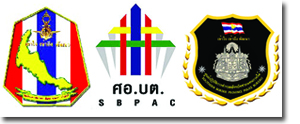Another new organization for the deep South?
 The government has decided to set up a new organization to deal with unrest problem and development in the five southern provinces of Yala, Pattani, Narathiwat, Songkhla and Satun provinces.
The government has decided to set up a new organization to deal with unrest problem and development in the five southern provinces of Yala, Pattani, Narathiwat, Songkhla and Satun provinces.
The decision was made at a special meeting of top security officials chaired by Prime Minister Yingluck Shinawatra on September 22. This followed three fatal bomb explosions in Sungai Kolok district of Narathiwat a week ago in which five people, including four Malaysian tourists, were killed and dozens of people wounded.
Deputy Prime Minister Kowit Wattana in charge of security affairs has been assigned by Prime Minister Yingluck Shinawatra to work out the organizational structure of the new organization, to be officially called the Southern Border Provinces Problem Solving and Development Centre (SBPSDC).
Government spokeswoman, Ms Thitima Chaisaeng, said the idea of the new organization was initiated by the Fourth Army Region to address the problem of disunity of the existing three agencies responsible for development and suppression operations in the deep South, namely the Southern Border Provinces Administration Centre (SBPAC) which is responsible for development, the Internal Security Operations Command (Isoc) and the Southern Border Provinces Police Operations Centre which are in charge of security affairs.
Once the SBPSDC is established, the SBPAC will become just a part of this new organization and its role will be limited to development work only.
Originally, there were two agencies overseeing security and development works in the deep South. There were the SBPAC in charge of development and the Task Force 43 Command in charge of security affairs which were set up in 1981 during the government of Prime Minister Prem Tinsulanonda. The SBPAC director was directly answerable to the prime minister.
In May 2002, then Prime Minister Thaksin Shinawatra ordered both the SBPAC and Task Force 43 Command to be dissolved. Ever since violence perpetrated by Islamic insurgents escalated prompting the Thaksin government to set up a panel to look into the unrest problem. The panel was led by the interior minister and was consisted of 35 members, none of them representing people in the five southern provinces. Regretably, the panel has never met.
Furthermore, the Thaksin administration also formed another panel called the Provincial Group Strategic Committee in line with his CEO provincial governor’s concept. However, the unrest situation did not improve until January 4, 2004 when insurgents attacked an army armoury in Cho Airong district of Narathiwat and stole a total of 413 guns, mostly M16 assault rifles. The incident marked the start of an undeclared insurgeny war waged by new-breed of insurgents.
After the daring gun robbery and other violent incidents, then Prime Minister Thaksin decided to set up a command, called the Southern Border Provinces Peace Enhancement Directorate led by then Deputy Prime Minister Chavalit Yongchaiyudh.
This new command is almost identical to Isoc which became dysfunctional after the Anti-Communism Act was scrapped by the Chuan administration in year 2000. The command was intended to bring the police, the military and civil servants operating in the deep South under the same roof to enhance unity.
Concurrently, the Thaksin government also set up the Southern Border Provinces Peace Enhancement Policy Directorate chaired by a deputy prime minister.
During the government of Prime Minister Surayud Chulanont, Isoc was revived by virtue of the Internal Security Act promulgated in 2008. But under the new organizational structure, the prime minister is the ex-officio of Isoc director with the army commander-in-chief as the deputy director and the army chief-of-staff as the secretary-general of Isoc.
Under the ISA, Isoc is the lead organization to deal with the unrest problem.
In the meantime, the Surayud government also revived the SBPAC and the Task Force Command. The first director of the resurrected SBPAC was Mr Pranai Suwannarat who has recently been named interior permanent secretary. Mr Pranai was succeeded by Mr Panu Uthairat, former governor of Pattani, in 2010.
However, the resurrected SBPAC could hardly carry out its “politics leading military actions” policy because the agency was answerable to Isoc and all its expenditure had to be approved by Isoc. It was only in December last year that the first SBPAC law came into force and SBPAC became an independent agency with Mr Panu as its first secretary-general.
The future of the new SBPAC appears doomed with a new organization to be set up by the Yingluck government. But whether the new organization will succeed in restoring peace and prosperity in the deep South remains a big question mark.
